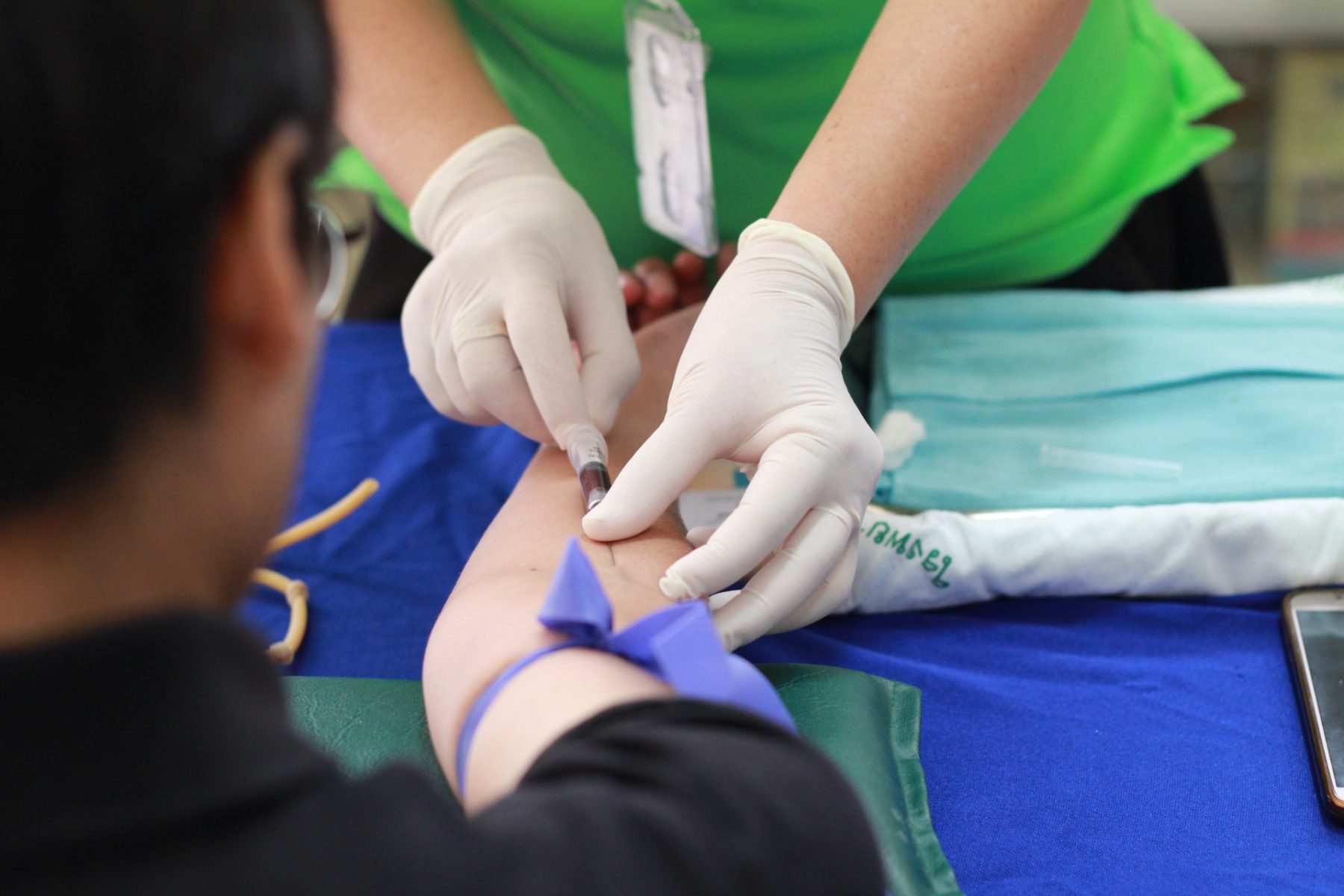CNA Classes in Utah

If you would like to start a career in healthcare, you may consider enrolling in CNA classes in Utah. Over the next decade we will see a massive shortage of healthcare professionals required to meet the overwhelming demand brought on by the aging population. In the Beehive State, you will find that the call for new healthcare professionals including certified nursing assistants is higher than the national average. By attending one of the CNA programs in Utah you will be on your way to a career that is very high in demand. CNA training in Utah isn’t that hard to find. A number of community colleges, hospitals, vocational schools and some nursing homes offer programs. If you are computer savvy, you can even consider attending one of the online CNA programs so you can train from home. The programs listed below are currently accepting applications from prospective students!
Are you thinking about a career in nursing? And if you have the qualities of a nurse whose patients will love them? If so, you’re making a great choice.
The U.S. Bureau of Labor Statistics says that the number of RNs in our country will increase to 3.4 million by 2022 — that’s a 19 percent increase since 2012. As of 2016, 3.2 million nurses worked in the United States.
But the profession isn’t for everyone.
If you’re thinking about this career, you should know the qualities of a nurse that ensure patients receive the best care. After all, becoming a nurse and being thought of a Nurse Ratchet won’t do anyone any good!
What Do Nurses Do?

Image by pressfoto via Freepik
Nurses operate in many different areas such as hospitals, clinics, nursing homes, shelters, schools, medical offices, and even camps. They have various duties, depending on where they work and what they choose to specialize in.
But most nurses perform at least the following tasks:
- Taking medical histories from patients
- Performing physical exams
- Giving medication to and wound care to patients
- Talking to patients about preventative care, as well as educating and counseling them on health matters
- Coordinating patient’s health care with other providers
- Supervising nursing assistants, LPS’s and other healthcare staff
- Research
- When working without supervision, decision making about a patient’s care
Does this sound like something you would like to do? Let’s check to see if you’ve got what it takes to become a nurse.
7 Signs You Should Become A Nurse

Image by via Freepik
Not everyone is cracked up to work in this demanding occupation. However, if you have any of the following characteristics, a career in nursing may be perfect for you.
Do any of these traits sound like you?
1. You possess the following quality
Are you the type of person who is comfortable with what you know? Or do you like to continuously learn new things? To be a great nurse, you should be teachable.
Here’s what you should know:
That means even if you think you know how to do something, you should be open to listening and learning new methods.
2. You love to do this
If you love the idea of working with people all day and helping them solve their problems, a nursing career might be right for you.
On the other hand, if you would rather sit in an office all day and limit your interactions with other people, it might now be the best choice for you.
3. Bring it on
Is that what you say when someone tells you something will be hard work?
I’ve got good news: Nursing may be for you.
If you’re looking for a cushy career, run in the opposite direction of the nursing school.
A nurse works hard — all day every day. But one of the qualities of a nurse is that they don’t mind all that work. They feel that the payoff of helping other people is worth it.
If you can see yourself working hard all day to help others, you may have the qualities of a nurse.
4. The following goal is all you have ever wanted
Imagine a career where you can go to work in the morning, and by the time you leave that afternoon, you will have changed someone’s life for the better.
That’s what nurses do.
Whether you speak a kind word to someone who is suffering or give hope to someone without it, a nurse can drastically influence their patient’s lives.
If you love the idea of making a difference in people’s lives, a nursing career could be right for you.

image via Freepik
5. Seeing a sick person makes you want this
If you’re the type of person who wants to help people get better, you may have the necessary qualities of a nurse. Nurses don’t like to see people who don’t feel well, and they do all they can to help make them better.
In fact, that’s what drives them.
6. Security is a thing
In addition to all the great qualities of a nurse that involve helping others and making them feel better, another sign that you might make a great nurse is if you want job security. Nurses experience a solid career with endless opportunities. That means you will always be able to provide for your family, and will probably never be without a job.
Who doesn’t want that?
7. What blood?
Sure, there are stories of nurses overcoming their fear of blood and going on to become great nurses, but in reality, if you are afraid of needles, faint when you see blood, or get squeamish during medical procedures, a nursing career may not be right for you.
On the other hand, if you can handle the goriest of sights, you just might be a great nurse.
What do you think? Do you have what it takes? Let’s move on to learn about the qualities of a nurse that make patients feel well cared for.
15 Qualities of a Nurse That Ensures Patients Get Good Care

Image via Pexels
As a nurse, you will work with people during some of the worst times of their lives. They may not feel well, have just been given a bad diagnosis, or are fighting to stay well in dire circumstances. Or you may have to deal with the parents of a small child who is ill, or of an adult child who is worried about their parent.
Any way you look at it, someone in this profession needs the qualities of a nurse that comforts, provides knowledge and education, and steers patients toward what will help them most.
In other words, if you’re considering this profession, you should first check to see if you have the qualities of a nurse that ensures the best patient care.
Here is a list of 15 qualities every nurse should have.
1. People often say you are…
Caring and compassionate.
In a recent Gallup poll, the public once again voted nurses as the profession they view as the most honest and ethical. This makes the 17th year in a row that nurses won that honored distinction.
And there’s a reason for that:
Nurses are filled with compassion and caring for others, and this causes them to act in a way that others perceive as caring.
If you don’t honestly care about others, or have compassion for people who are in trying and difficult times, you may not have the qualities of a nurse that gains people’s trust.
2. Communication Is Not Just A Skill, It’s A Gift
Excellent communication skills are not something that can be taught.
As a nurse, you will need to listen to the doctor’s orders, the patient’s complaints, and the stories and insight from family members. If you’re not paying attention, it could compromise the quality of care for the patient.
One of the best qualities of a nurse is the ability to read between the lines when it comes to listening to patients. And to that, you will have to listen closely.
For instance, if a family member tells you something about a patient that they say is out of the ordinary for them, it’s a clue that you should take seriously.
And in addition to great listening skills, you should also have the ability to communicate with patients and their families in a way that makes them feel cared for, listened to, and respected. Using a soft, confident tone will go a long way in patient communications — even when the patient or family is uncooperative.
If you can listen and take in what others are saying, and communicate in a way that calms patients and gives them confidence, you have one of the most essential qualities of a nurse who cares.

Image by katemangostar via Freepik
3. The desire to be a champion…
Do you advocate for people?
When it comes to qualities of a nurse that ensure great patient care, a sense of advocacy is one of the most important attributes.
In fact, it’s so critical to a good nurse/patient relationship that you can further your education by taking courses on advocacy.
At its root, nurse advocacy happens when a nurse helps carry out a patient’s wishes or helps to achieve certain goals for the patient.
For example, the nurse may provide the patient with the information they need to make an informed decision, talk to a patient’s family about their wishes, or act as a go-between when the patient has a conflict with the doctor.
In short, as a nurse, you will strive to ensure that your patients receive the best care they can.
And as a nurse advocate, you can be choosey about who you advocate for. You will have to form close relationships with your patients and help them achieve their goals.
That means you will need to advocate for the rich and the poor, the nice and the not-so-nice, the well, and those who are critically ill.
The qualities of a nurse that stress advocacy is so important because, with the right attitude, a nurse can transform a difficult patient by simply caring for them and making them feel heard.
If you want to begin your nursing career with an emphasis on advocacy, you can take the course as the RN Patient Advocates, PLLC, which is a nationally recognized program. Or you can take a credentialing program at Healthcare Liaison, Inc.
4. Do you hear that?
Because nursing is such a demanding job, the best nurses feel a calling to become a nurse, and that’s what propels them to go on to the best nurse they can.
And the calling is different for every person. It’s an inner yearning to make a difference in other people’s lives that you can can’t ignore.
Here are some of the reasons why you may feel called to be a nurse:
- You have a relative who is a nurse, and they inspired you to pursue the profession
- At one time, a nurse gave you care filled with compassion and warmth, and you feel a need to give back
- You want to help others who need it, and that’s coupled with a strong desire for knowledge
- You had a life-threatening medical condition, or almost died due to an illness, and you want to use your experience to help others get through it
- You’ve wanted to become a nurse for as long as you can remember
5. Patients aren’t all a nurse needs…
Imagine a day when you’re trying to carry out several doctor’s orders, and at the same time, you’re trying to stay in compliance with the hospital, unit, state, and federal policies. At the same time, your patients demand your attention, and you’re behind on your nursing care plans.
Yep, nurses need patience.
And this is a typical day as a nurse. If you’re going to become a nurse, make sure that you have the patience to deal with multiple people needing your attention throughout the day, as well as a list of tasks that you have to complete.
When you are patient and tolerant of the others who are demanding your attention, your calming presence will help the situation. And this will help you treat your patients and deal with their family members better.
6. It’s not about what is needed right now
A good nurse is sometimes the only thing that stands between life and death for a patient.
That may sound exaggerated, but imagine this:
A patient who can’t speak or gesture is having problems breathing. An aware nurse will recognize the signs that the patient is in distress and take the necessary actions to help.
On the other hand, if the nurse can’t anticipate issues by being diligent and aware, that patient may never get the help they need.
A nurse is the first line of defense for many patients, and they should be the eyes, ears, and voice for those who can’t express themselves.
When a nurse notices a change in tone, a desperate look in the eye, or a sudden change in personality, they can intervene and get them the medical help they need.

Image by rawpixel.com via Freepik
7. Your managing charts and lives, so this is essential
As a nurse, you will have a lot of people to answer to. You have to fill doctor’s orders, comfort patients and give them the medications and procedures the doctor orders, talk to and comfort family members, perform patient assessments, adhere to documentation procedures, reposition patients every couple of hours, answer doctor’s questions, and run down the things people ask you for.
You need some serious time management skills to be an effective nurse.
For example, if you work at a hospital, you may have 6 to 12 patients at a time, and if you work in the ICU, you may have 1 to 3 full-time patients during your shift.
If you are good at time management, your nursing career will benefit — as will the patients. And once you develop those skills, your chances of burnout decrease because it will allow for a smoother, less stressful day.
8. The name of the game is stamina
You might think being a nurse means lifting nothing heavier than a blood pressure cuff or a needle, but that’s not the case.
The truth is that nurses are more likely to suffer a back injury while on the job than construction workers.
Yes, you read that correctly.
During a normal shift, most nurses will transfer 5 to 10 patients from a chair to a bed, and lift 20 patients into a bed. In other words, nursing is back-breaking work.
And in addition to lifting patients, you will need to rush to emergencies and walk long distances every day down the corridors of the hospital.
If you’re going to become a nurse, you should be in tip-top condition to enable you to perform your duties and avoid these types of injuries.
9. This skill set is indispensable
No matter what type of nursing position you’re in, you will have to have some leadership skills to make the most of your job.
For instance, you will need to guide patients away from sickness and to a healthier life. You will also help steer physicians to a better understanding of the patient, which will result in a better outcome. And you will have to lead some coworkers, instructing them in everyday tasks.
If you already have these skills, you have one of the most important qualities of a nurse that you need.
If you haven’t yet developed leadership skills, you can take a course, or read experts like Catherine Robinson-Walker.
In her book, “Leading Valiantly in Health Care: Four Steps to Sustainable Success,” she says there are six common pitfalls of leaders, which she identifies as:
- Being stuck in your own perspective instead of listening to others
- Creating a distorted reality
- Disengaging from your work environment
- Not paying attention to what’s important, but being distracted by other things
- Saying no to everything
- Focusing on everyone else instead of your own perceptions and thoughts
You can also take nurse leadership and management courses to improve your leadership skills.

Image via Freepik
10. Practice, practice, practice
The number of years on the job isn’t the only experience that leads to great qualities of a nurse. You can get experience earning a higher degree, participating in an internship, traveling as a nurse, conducting research, and taking online courses or attending conferences.
All of these things add up experience that results in a wealth of knowledge you can apply to your job.
You can build this experience as you go in your nursing career. But a desire to continually increase your skills should be a driving factor for you.
11. Narcissists need not apply
Nurses work behind the scenes, and it’s vital that you are comfortable with the fact that you won’t be the star of the room.
And humility also serves another vital role in the life of a nurse.
A nurse shouldn’t believe they know everything, but instead should be open to suggestions from patients, their family members, and other staff. A good nurse is a detective, remember? And sometimes the clues come from people other than ourselves.
12. It may seem counter-intuitive, but for nurses
Too many nurses become defensive because others in the profession mistreated them, but that defensiveness will not serve the patient well.
Instead, nurses should adopt a spirit of servanthood. That doesn’t mean you will be everyone’s doormat. However, it does mean that you put yourself last to give the patient the best possible care.
For instance, instead of needing to be right all the time, allow others to explain their position and then think about what’s best for the patient.
Servanthood is one of those qualities of a nurse that leads to exceptional care for their patients.
13. Patch Adams had a pretty great idea
Let’s face it; nursing is one of those professions when you need to have a sense of humor. You never know what the day will bring. If you take unexpected events in stride, your patients will be better for it.
If you have a sense of humor, you already have one of the best qualities of a nurse. Perhaps not to Patch Adams’ levels, but that sense of humor is essential.

Image via Freepik
14. Let’s talk about problem-solving
As a nurse, people will constantly bombard you with questions and problems, some of them emergencies. And the ability to think on our feet and solve problems quickly is one of the most important qualities of a nurse that ensures good patient care.
For example, if your patient complains of chest pains, you can’t simply go to the doctor and report it. You must be able to look at the situation and decide how to best address it. Will you call an emergency? Or will you try to calm the patient because you know they’re terrified of going into surgery?
As a nurse, it will be up to you to play detective. You give the doctor all the information they need. You cannot just give them the basics of a patient’s complaint.
For example, if you report chest pains to a doctor, you should also include important details such as the patient’s vital signs, EKG results, pain ratings, and anything else they need to make a good call.
15. That Degree Is Just The Start Of A Nurse’s Journey
When you get your nursing degree and certification, your education doesn’t stop there. In fact, as a nurse, you are required to take continuing education courses in most states. Or at least fulfill a required number of contact hours.
And to keep those skills up-to-date so you can give patients the best care, you will need to continually learn how to operate new equipment, procedures, and techniques. Healthcare is always evolving. So, one of the qualities of a nurse to provide the best care is a thirst for learning.
What’s more, you can increase your education as a nurse and go on to specialize in whatever interests you, or you can even move into other fields in the healthcare profession.
If you love the idea of keeping up with the latest healthcare trends and studies, you are probably right for a nursing career.
A Word About Soft Skills for Nurses

Image by rawpixel.com via Freepik
As the healthcare industry continues to change, one of the qualities of a nurse most wanted by both patients and employers is soft skills.
That includes things like the ability to communicate with patients and the way you interact with them.
In fact, 60 percent of patients say better communication with their nurse would have improved their hospital stay. And employers are paying attention to this.
More than 80 percent of nurse managers say that they want to hire nurses with professional and interpersonal skills.
So if you plan to become a nurse, one of the qualities for nurses you should concentrate on are these soft skills that provide better experiences for patients.
What Qualities of a Nurse Do You Have?

Image via Freepik
It’s important to remember that not all nurses have every skill listed above. Some nurses are stars at personal interactions with their patients, while others are fantastic problem solvers. The key is to develop the qualities of a nurse that you feel you could excel in.
Are you a practicing nurse? If so, we would love to hear your insight in the comments below. Did we forget any important qualities of a nurse, or would you like to add anything else?
Featured Image via Freepik
| Name | City | Type | Graduation Rate |
|---|---|---|---|
| Southwest Applied Technology Center | Cedar City | < 2-year, Public | 63% |
| Snow College | Ephraim | 4-year, primarily associate’s, Public | 47% |
| Davis Applied Technology College | Kaysville | 2-year, Public | 28% |
| Mountainland Applied Technology College | Lehi | 2-year, Public | 84% |
| Ogden-Weber Applied Technology College | Ogden | 2-year, Public | 37% |
| Uintah Basin Applied Technology College | Roosevelt | < 2-year, Public | 68% |
| Dixie State University | Saint George | 4-year, primarily associate’s, Public | 36% |
| Salt Lake Community College | Salt Lake City | 2-year, Public | 23% |
| Tooele Applied Technology College | Tooele | 2-year, Public | 30% |
| Bridgerland Applied Technology College | West Logan | 2-year, Public | 54% |
The CNA certification training programs in Utah are federally required to be at least 75 hours of classroom instruction and 16 hours of clinical skills training. Courses for CNAs include basic patient care including how to take vitals such as blood pressure and heart rate. Once you have successfully completed training program you will be eligible to take the competency evaluation exam. This is a two-part exam with multiple choice questions and live demonstration of the skills you learned while in CNA classes in Utah. You must pass both parts of this exam in order to become certified and listed in the state’s Nursing Registry.
Maintaining Your Certification
Your CNA certification in Utah is valid for 24 months. During the 24 months of your activation of your certification you will be required to work and receive monetary compensation for at least 200 hours in a licensed healthcare setting. Approximately 45 days before your licensure expiration date you will be mailed a renewal form from the State of Utah.
According to the government run CareerOneStop.com, the projected increase in number of CNA positions is expected to rise by as much as 42%. This is well higher than the national average. Below is a chart comparing the national average and Utah for the number of job openings expected over the next 10 years.
| State | 2010 | 2020 | Percent Change | Projected Job Openings |
|---|---|---|---|---|
| Utah | 10,370 | 13,320 | 430 | 29% |
Source: Utah State Job Outlook
Believe it or not, a certified nursing assistant salary can be fairly lucrative especially. This is fairly impressive you when you take in to account that you do not need a post-secondary degree to become a CNA. In the following chart we will compare the median salary range for a CNA in Utah and for the U.S.
| Type | Bottom 10% | Bottom 25% | Median | Top 75% | Top 90% |
|---|---|---|---|---|---|
| Hourly | $8.99 | $9.89 | $10.86 | $12.06 | $13.97 |
| Yearly | $18,700 | $20,600 | $22,600 | $25,100 | $29,100 |
Source: Utah Wage Information
